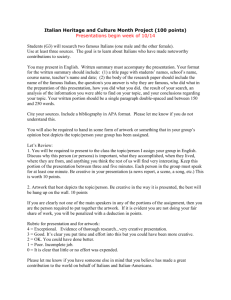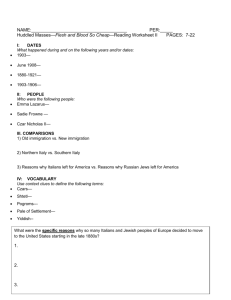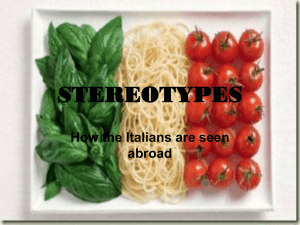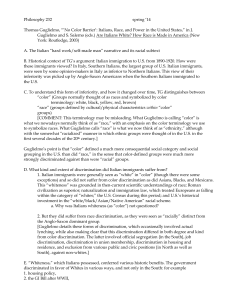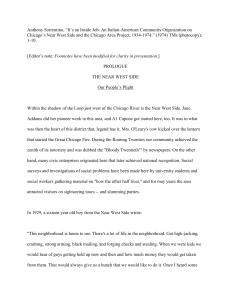“Document Analysis – Italophobia” Expert Group Packet
advertisement
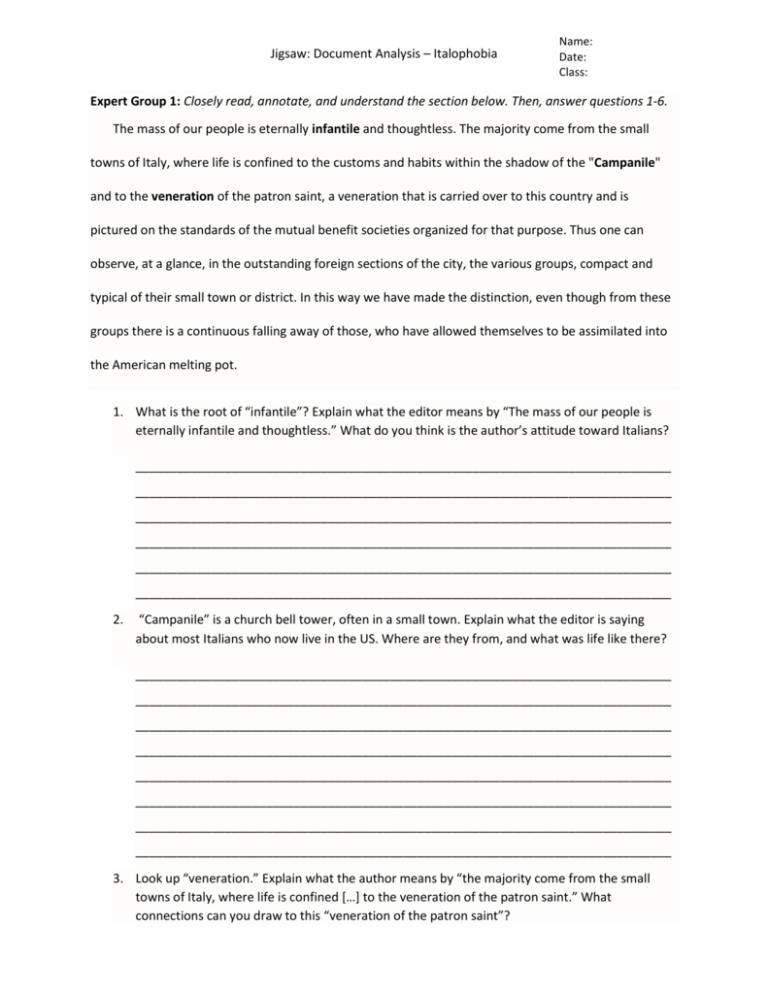
Jigsaw: Document Analysis – Italophobia Name: Date: Class: Expert Group 1: Closely read, annotate, and understand the section below. Then, answer questions 1-6. The mass of our people is eternally infantile and thoughtless. The majority come from the small towns of Italy, where life is confined to the customs and habits within the shadow of the "Campanile" and to the veneration of the patron saint, a veneration that is carried over to this country and is pictured on the standards of the mutual benefit societies organized for that purpose. Thus one can observe, at a glance, in the outstanding foreign sections of the city, the various groups, compact and typical of their small town or district. In this way we have made the distinction, even though from these groups there is a continuous falling away of those, who have allowed themselves to be assimilated into the American melting pot. 1. What is the root of “infantile”? Explain what the editor means by “The mass of our people is eternally infantile and thoughtless.” What do you think is the author’s attitude toward Italians? ______________________________________________________________________________ ______________________________________________________________________________ ______________________________________________________________________________ ______________________________________________________________________________ ______________________________________________________________________________ ______________________________________________________________________________ 2. “Campanile” is a church bell tower, often in a small town. Explain what the editor is saying about most Italians who now live in the US. Where are they from, and what was life like there? ______________________________________________________________________________ ______________________________________________________________________________ ______________________________________________________________________________ ______________________________________________________________________________ ______________________________________________________________________________ ______________________________________________________________________________ ______________________________________________________________________________ ______________________________________________________________________________ 3. Look up “veneration.” Explain what the author means by “the majority come from the small towns of Italy, where life is confined […] to the veneration of the patron saint.” What connections can you draw to this “veneration of the patron saint”? Jigsaw: Document Analysis – Italophobia Name: Date: Class: ______________________________________________________________________________ ______________________________________________________________________________ ______________________________________________________________________________ ______________________________________________________________________________ ______________________________________________________________________________ ______________________________________________________________________________ ______________________________________________________________________________ 4. Is the “veneration of the patron saint” a form of assimilation or resistance to it? Explain. ______________________________________________________________________________ ______________________________________________________________________________ ______________________________________________________________________________ ______________________________________________________________________________ ______________________________________________________________________________ ______________________________________________________________________________ 5. According to the editorial, some Italians have “allowed themselves to be assimilated into the American melting pot.” What do you think the editor means by that? What is this “melting pot”? ______________________________________________________________________________ ______________________________________________________________________________ ______________________________________________________________________________ ______________________________________________________________________________ 6. Write the central idea of this section. Then, write a quote that could best be used as evidence of whether Italians in the 1920s had assimilated into American culture. Central Idea: ___________________________________________________________________ ______________________________________________________________________________ ______________________________________________________________________________ ______________________________________________________________________________ Quote: ________________________________________________________________________ ______________________________________________________________________________ ______________________________________________________________________________ ______________________________________________________________________________ ______________________________________________________________________________ Jigsaw: Document Analysis – Italophobia Name: Date: Class: Expert Group 2: Closely read, annotate, and understand the section below. Then, answer questions 7-13. We say, "American." The distinction is made by our own people to whom anyone, who does not speak Italian, is an American. He might be Jewish, Croatian, Polish, Irish, and so forth, but, to us, he is an "American." And this ingenuous distinction which we owe to the dull observation of the newly arrived, finds an echo in the Italophobic press, which reports with accentuated emphasis the deeds of Italian character and those which it refers to as typically Sicilian. 7. Who do Italians count as “American,” according to the editor? Do you think immigrant groups think the same way today, or has the view of who is “American” changed? ______________________________________________________________________________ ______________________________________________________________________________ ______________________________________________________________________________ ______________________________________________________________________________ ______________________________________________________________________________ ______________________________________________________________________________ 8. Define “ingenuous” by either identifying its root or looking it up. Define “distinction.” What is the “distinction” the editorial mentions, and how is it ingenuous? Do you think it is ingenuous? Why or why not? ______________________________________________________________________________ ______________________________________________________________________________ ______________________________________________________________________________ ______________________________________________________________________________ ______________________________________________________________________________ 9. The editor refers to the “dull (dumb) observation of the newly arrived.” Assuming the editor has lived in America for a few years, what does this mean about how established immigrants may view new immigrants? Do you think this distinction still exists between established and new immigrants? Explain. ______________________________________________________________________________ ______________________________________________________________________________ ______________________________________________________________________________ ______________________________________________________________________________ ______________________________________________________________________________ Jigsaw: Document Analysis – Italophobia Name: Date: Class: 10. What makes the press (newspapers) “Italophobic”? Define “accentuated” and explain what the press reports with “accentuated emphasis.” ______________________________________________________________________________ ______________________________________________________________________________ ______________________________________________________________________________ ______________________________________________________________________________ ______________________________________________________________________________ 11. What kinds of “deeds of Italian character” do you think the press is reporting (hint: they’re bad)? ______________________________________________________________________________ ______________________________________________________________________________ ______________________________________________________________________________ ______________________________________________________________________________ 12. Sicilians come from an island off the coast of Italy, but the newspapers are labeling Italians who commit these deeds as “Sicilian.” How do you think a Sicilian would feel about this? How do you think someone from another part of Italy would feel about this? How do you think an American whose family has lived in the US for one hundred years feel about this? ______________________________________________________________________________ ______________________________________________________________________________ ______________________________________________________________________________ ______________________________________________________________________________ ______________________________________________________________________________ 13. Write the central idea of this section. Then, write a quote that could best be used as evidence of whether Italians in the 1920s had assimilated into American culture. Central Idea: ___________________________________________________________________ ______________________________________________________________________________ ______________________________________________________________________________ ______________________________________________________________________________ Quote: ________________________________________________________________________ ______________________________________________________________________________ ______________________________________________________________________________ ______________________________________________________________________________ Jigsaw: Document Analysis – Italophobia Name: Date: Class: Expert Group 3: Closely read, annotate, and understand the section below. Then, answer questions 14 20. The fault lies in our excessive Italianism. We wave the Italian flag at a reckless height over a land which we do not dominate, be it by numbers, by inheritance, or for any other reason. That flag we must keep in our hearts. It is unwise to wave it in the face of a native element that, though having reverence for our ancestors, is intolerant of a people that is competing with it in the economic field. The local Italian press can teach the newcomers as well as those who have had a longer period of residence, one very important point, that in America one must do as the "Americans," just as our ancestors said, "When in Rome do like the Romans." The Italian quarters should disappear, as they are disappearing, though very slowly. With the Italian quarters dismembered it will be easy to eliminate that odious classification, which is applied to our people. 14. In the previous section, the editor blames the “Italophobic press” for reporting the bad deeds of Italians. Here, he says, “The fault lies in our excessive Italianism.” What does that mean? Use evidence from this paragraph to explain. ______________________________________________________________________________ ______________________________________________________________________________ _____________________________________________________________________________ ______________________________________________________________________________ 15. Define “inheritance.” The editor uses the Italian flag as a metaphor, saying, “we wave [it] at a reckless height over a land we do not dominate, be it by numbers, by inheritance, or for any other reason.” Does he mean that Italians should not be proud of their heritage? Draw a connection to a modern-day immigrant group and its ethnic pride. ______________________________________________________________________________ ______________________________________________________________________________ ______________________________________________________________________________ ______________________________________________________________________________ ______________________________________________________________________________ 16. Who do you think the editor means by the “native element”? Why is it unwise to “wave [the Italian flag] in the face of the native element? Do you think it is unwise for modern-day immigrants to “wave their flags” in the face of today’s “native element”? Why or why not? Jigsaw: Document Analysis – Italophobia Name: Date: Class: ______________________________________________________________________________ ______________________________________________________________________________ ______________________________________________________________________________ ______________________________________________________________________________ 17. Define “reverence.” How do you think the editor wants Italians to have “reverence for [their] ancestors” while keeping the flag “in [their] hearts”? ______________________________________________________________________________ ______________________________________________________________________________ ______________________________________________________________________________ 18. The editor says that Italian newspapers “can teach the newcomers” and other Italians that “in America one must do as the ‘Americans,’ just as our ancestors said, ‘When in Rome do like the Romans.’” Using the word “assimilation,” explain what this means. Do you agree that immigrant groups should “do as the ‘Americans’”? Why or why not? ______________________________________________________________________________ ______________________________________________________________________________ ______________________________________________________________________________ ______________________________________________________________________________ ______________________________________________________________________________ 19. By “Italian quarters,” the editor means Italian neighborhoods. What is the purpose of “dismembering” (define) these neighborhoods? How will that help Italians eliminate that “odious classification” (define and explain)? ______________________________________________________________________________ ______________________________________________________________________________ ______________________________________________________________________________ ______________________________________________________________________________ 20. Write the central idea of this section. Then, write a quote that could best be used as evidence of whether Italians in the 1920s had assimilated into American culture. Central Idea: ___________________________________________________________________ ______________________________________________________________________________ ______________________________________________________________________________ Quote: ________________________________________________________________________ ______________________________________________________________________________ ______________________________________________________________________________ Jigsaw: Document Analysis – Italophobia Name: Date: Class: Expert Group 4: Closely read, annotate, and understand the section below. Then, answer questions 2125. Discard your old country loyalties and your enemy will be left without a target. In fact, I am sure that only in this manner can we obtain the dissolution of all animosities. Because your foe is not that which you have imagined him to be, the antithesis of all things Italian. On the contrary he, whom you call an enemy, is the true friend to the Italian. The "American" desires the Americanization of the Italian, developed and interested in the community, as an integral part and not like a worm that slowly gnaws into its peace and future. The Italian who knows how to act will never find any animosity directed against him. On the contrary, he will be respected. America, in the main, has learned to appreciate the Italian, to understand and to hold him in high esteem when he merits it. But it aims to rid itself of all those Italians who know not how, nor want to respect, the laws and customs of this country which has been so hospitable and generous. 21. Explain who “the enemy” is. Why do you think “discard[ing] old country loyalties” will leave the enemy “without a target”? Think about how this might have applied to Italians in 1925 and how it may apply to immigrants, particularly from Latin America, today. ______________________________________________________________________________ ______________________________________________________________________________ ______________________________________________________________________________ ______________________________________________________________________________ ______________________________________________________________________________ ______________________________________________________________________________ ______________________________________________________________________________ 22. Define “dissolution” and “animosities.” Explain what it would mean for Italians to “obtain the dissolution of all animosities.” ______________________________________________________________________________ ______________________________________________________________________________ ______________________________________________________________________________ ______________________________________________________________________________ ______________________________________________________________________________ Jigsaw: Document Analysis – Italophobia Name: Date: Class: 23. Define “antithesis.” How is the perceived enemy of Italians not the “antithesis of all things Italian” but actually the “true friend”? Use the word “assimilation” in your response. ______________________________________________________________________________ ______________________________________________________________________________ ______________________________________________________________________________ ______________________________________________________________________________ ______________________________________________________________________________ ______________________________________________________________________________ ______________________________________________________________________________ 24. The section ends with two key points: “America, in the main, has learned to appreciate the Italian, to understand and to hold him in high esteem when he merits it. But it aims to rid itself of all those Italians who know not how, nor want to respect, the laws and customs of this country which has been so hospitable and generous.” Define “hospitable” and explain what this quote means. Do you agree with it? How does it apply today? Should Mexicans, for example, disown other Mexicans who break laws? Why or why not? ______________________________________________________________________________ ______________________________________________________________________________ ______________________________________________________________________________ ______________________________________________________________________________ ______________________________________________________________________________ ______________________________________________________________________________ ______________________________________________________________________________ ______________________________________________________________________________ ______________________________________________________________________________ 25. Write the central idea of this section. Then, write a quote that could best be used as evidence of whether Italians in the 1920s had assimilated into American culture. Central Idea: ___________________________________________________________________ ______________________________________________________________________________ ______________________________________________________________________________ ______________________________________________________________________________ Quote: ________________________________________________________________________ ______________________________________________________________________________ ______________________________________________________________________________ ______________________________________________________________________________

